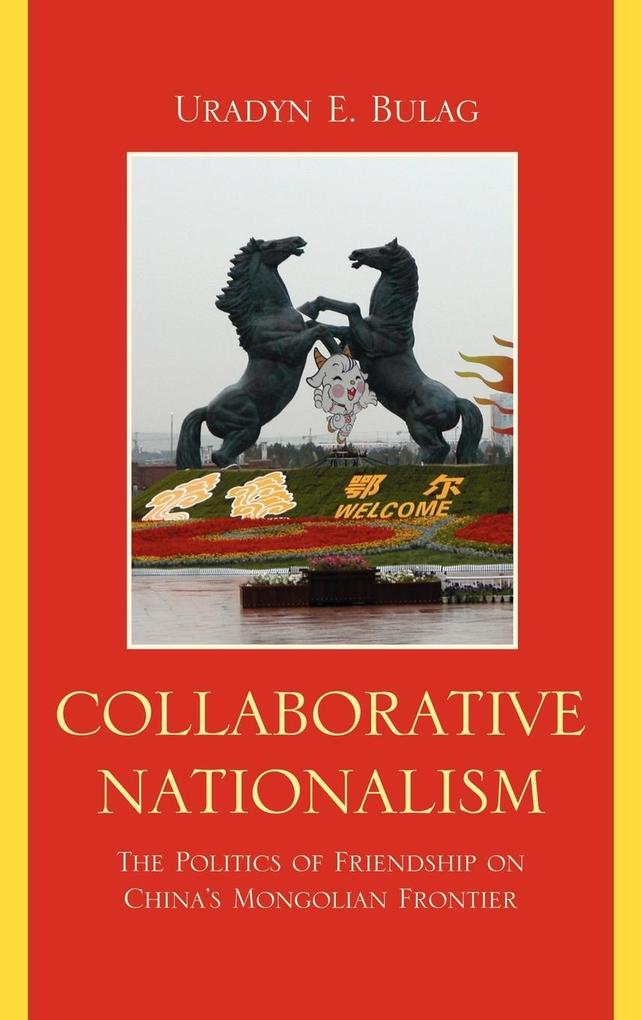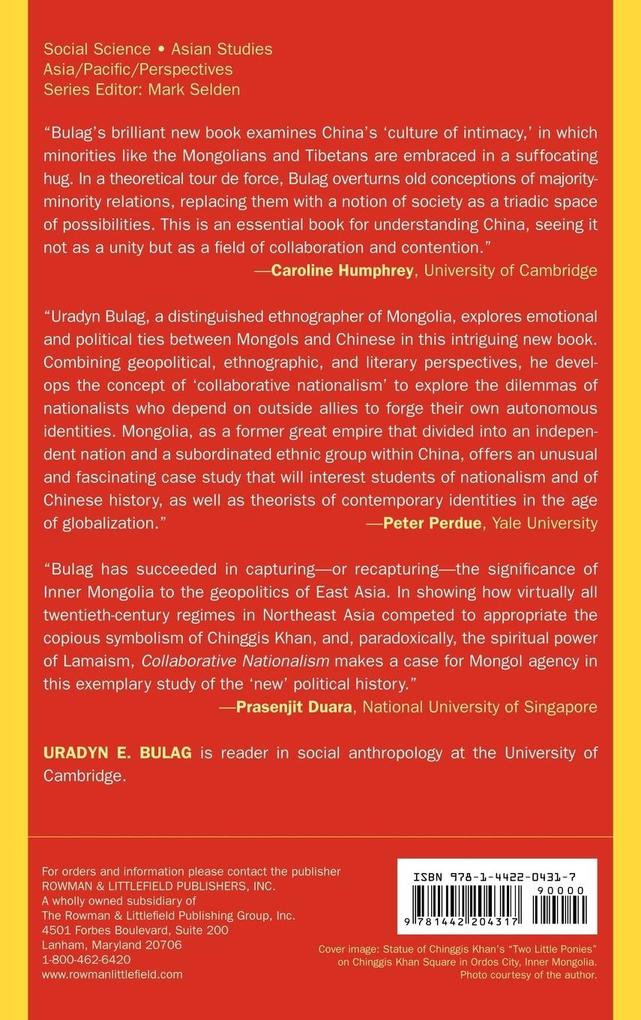
Zustellung: Fr, 30.05. - Di, 03.06.
Versand in 1-2 Wochen
VersandkostenfreiBestellen & in Filiale abholen:
In this deeply original study of the Mongols, leading scholar Uradyn E. Bulag draws on key themes of cosmopolitanism and friendship to develop a new concept he terms "collaborative nationalism." He uses this concept to explore the dilemma of minorities in China as they fight against being embraced too tightly in the bonds of "friendship." Through a rich array of case studies, Bulag illuminates the fierce competition among China, Japan, Mongolia, and Russia to appropriate the Mongol heritage to buttress their own national identities. Weighing the options the Mongols face, he argues that the ethnopolitical is not so much about identity as it is about the capacity of an ethnic group to decide and organize its own vision of itself, both within its community and in relation to other groups.
Inhaltsverzeichnis
Introduction: Triangulating China's Ethnopolitics
Part I: Subimperial Desires
Chapter 1: Hunting Chinggis Khan's Skull and Soul
Chapter 2: Lamas to the Rescue: Tibeto-Mongolian Buddhism and Imperial Nationalisms
Part II: Collaborative Nationalism
Chapter 3: Friendship, Treason, and Collaborative Nationalism
Chapter 4: Yearning for Friendship: The Political in Minority Revolutionary History
Part III: Interethnic Intimacy
Chapter 5: The Flight of the Golden Pony: Socialism and the Stillbirth of the Mongolian Working Class
Chapter 6: Interethnic Adoption and the Regime of Affection
Conclusion: The Specter of Interethnic Friendship
Bibliography
Part I: Subimperial Desires
Chapter 1: Hunting Chinggis Khan's Skull and Soul
Chapter 2: Lamas to the Rescue: Tibeto-Mongolian Buddhism and Imperial Nationalisms
Part II: Collaborative Nationalism
Chapter 3: Friendship, Treason, and Collaborative Nationalism
Chapter 4: Yearning for Friendship: The Political in Minority Revolutionary History
Part III: Interethnic Intimacy
Chapter 5: The Flight of the Golden Pony: Socialism and the Stillbirth of the Mongolian Working Class
Chapter 6: Interethnic Adoption and the Regime of Affection
Conclusion: The Specter of Interethnic Friendship
Bibliography
Mehr aus dieser Reihe
Produktdetails
Erscheinungsdatum
16. Juli 2010
Sprache
englisch
Seitenanzahl
302
Reihe
Asia/Pacific/Perspectives
Autor/Autorin
Uradyn E. Bulag
Verlag/Hersteller
Produktart
gebunden
Gewicht
644 g
Größe (L/B/H)
235/157/22 mm
ISBN
9781442204317
Entdecken Sie mehr
Pressestimmen
Bulag's brilliant new book examines China's 'culture of intimacy,' in which minorities like the Mongolians and Tibetans are embraced in a suffocating hug. In a theoretical tour-de-force, Bulag overturns old conceptions of majority-minority relations, replacing them with a notion of society as a triadic space of possibilities. This is an essential book for understanding China, seeing it not as a unity but as a field of collaboration and contention. -- Caroline Humphrey, University of Cambridge Uradyn Bulag, a distinguished ethnographer of Mongolia, explores emotional and political ties between Mongols and Chinese in this intriguing new book. Mongolia, as a former great empire that divided into an independent nation and a subordinated ethnic group within China, offers an unusual and fascinating case study that will interest students of nationalism and of Chinese history, as well as theorists of contemporary identities in the age of globalization. -- Peter Perdue, Yale University Bulag has succeeded in capturing-or recapturing-the significance of Inner Mongolia to the geopolitics of East Asia. In showing how virtually all twentieth-century regimes in Northeast Asia competed to appropriate the world-conquering symbolism of Chinggis Khan, and, paradoxically, the spiritual power of Lamaism, Collaborative Nationalism makes a case for Mongol agency in this exemplary study of the 'new' political history. -- Prasenjit Duara, National University of Singapore
Bewertungen
0 Bewertungen
Es wurden noch keine Bewertungen abgegeben. Schreiben Sie die erste Bewertung zu "Collaborative Nationalism" und helfen Sie damit anderen bei der Kaufentscheidung.



































